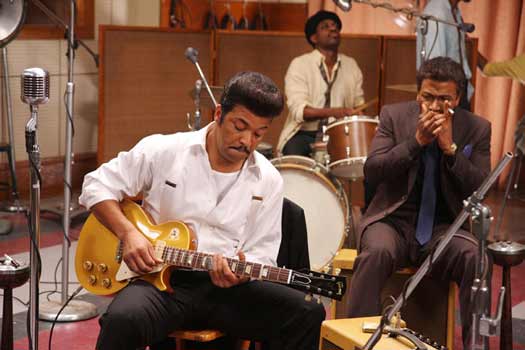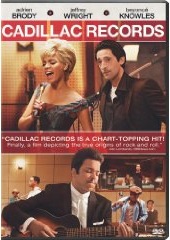On Film: Cadillac Records
If Only Tyler Perry Had Played Moms Mabley. And Where's Phil?
By James Porter
Jeffrey Wright as Muddy Waters (foreground), with Columbus Short as Little Walter, on harmonicaCadillac Records is a pretty good movie for what it is. Plenty of drama, a few laughs, some decent approximations of '50s blues, R&B and rock 'n' roll. Just don't confuse it with the facts, given that some seem to have been a bit untidy for the filmmakers to deal with—note, for instance, that Phil Chess, who co-founded Chess with his brother Leonard, is absent altogether from the story.
Written and directed by Daniel Martin, this filmed adaptation of the Chess Records story dramatizes the rise of the famed Chicago record company founded by Leonard and Phil Chess, whose awe-inspiring roster included Muddy Waters, Etta James, Chuck Berry, Howlin' Wolf and Little Walter. Unfortunately, Martin would have you believe that these were the only acts on Chess, forgetting Bo Diddley, the Dells, Sonny Boy Williamson, and several other major and minor artists who made this South Loop-located label one of the most formidable independent operations of the first rock 'n' roll era. Look closely—even in the scenes in Leonard Chess' office, the only album covers and photographs seen are of Muddy, Wolf, Walter, Chuck and Etta. Too bad; they could have gotten Tyler Perry to play Moms Mabley and he would have stolen the show. The blues fan and record collector in me could sit for hours checking out the various errors ("Iodine In My Coffee" by Muddy Waters did not make it to #1 on Billboard's R&B charts). But as far as pure entertainment...not a bad movie. Martin tapped some formidable Chicago area talent for the soundtrack: Billy Flynn, Larry Taylor, Barrelhouse Chuck and Eddie Taylor, Jr., along with harp player Kim Wilson (Fabulous Thunderbirds).
Fortunately, Beyonce Knowles does not bogart the whole movie. Sure, she has a prominent role as Etta James, was one of the project's financial backers and even has one of her songs (rather than a blues or old school R&B track) played over the closing credits; but in the general scheme of things she is just another character in the stellar Chess lineup. The linchpin of the film is Muddy Waters (Jeffrey Wright), through whose eyes most of the action unfolds, even though the real guiding hand, as songwriter/musician/band leader, was Willie Dixon (Cedric the Entertainer). Muddy is depicted as the first artist on the label, and whenever something significant happens, he's always on the scene. Waters and Wolf (Eamonn Walker) have their excesses, and Etta James' drug addiction is given significant play, but Little Walter (Columbus Short) is the real wild card, drinking heavily, putting the make on other men's women, and riding around in a car with makeshift air conditioning (he ripped the doors off his car—a true story confirmed by Walter in an interview).
Mos Def portrays Chuck Berry in 'Cadillac Records'Blues movies made for theatrical release, as opposed to the countless documentaries extant, are few and far between; an all-day marathon would probably be sufficient to screen them all. So when the details are wrong, the oversights—whether accidental or, more likely, intentional for the sake of drama and/or concision—really stand out. Here the omissions go beyond puzzling into the realm of the incomprehensible, no matter the excuse: how could Phil Chess—the business end of the Chess brothers, who yielded to Leonard when it came to steering the studio sessions—have been omitted from this story? And to a lesser degree, Phil's son Marshall, who grew up in the Chess offices and studio, played an important role in its later history, and is now the guardian of his father's and uncle's enduring legacy to American music? Are we supposed to be thankful the movie came out as well as it did, rather than turning into another Black Snake Moan, with Samuel L. Jackson as a homicidal blues musician in the Delta who befriends the town nympho? And what to make of a segment towards the end which shows a couple of modern-day rappers doing a hip-hop version of Muddy's monument, "I'm A Man" (if you thought Chris Thomas King was bad...)?
Nevertheless, ignore such telling details—and let's face it, most moviegoers will—and Cadillac Records goes down easy as entertainment, nothing more. Interesting, though, and ironical perhaps, that one of the most striking images in the film is a complete figment of someone's imagination: a neon sign with the Chess logo revolving under a needle as if it were an actual record. Which begs the question: why didn't the Chess brothers think of that!?
Reprinted with permission from Chicago Blues Guide www.chicagobluesguide.com
THE BLUEGRASS SPECIAL
Founder/Publisher/Editor: David McGee
Contributing Editors: Billy Altman, Derk Richardson
Logo Design: John Mendelsohn (www.johnmendelsohn.com)
Website Design: Kieran McGee (www.kieranmcgee.com)
Staff Photographers: Audrey Harrod (Louisville, KY; www.flickr.com/audreyharrod), Alicia Zappier (New York)
E-mail: thebluegrassspecial@gmail.com
Mailing Address: David McGee, 201 W. 85 St.—5B, New York, NY 10024
Founder/Publisher/Editor: David McGee
Contributing Editors: Billy Altman, Derk Richardson
Logo Design: John Mendelsohn (www.johnmendelsohn.com)
Website Design: Kieran McGee (www.kieranmcgee.com)
Staff Photographers: Audrey Harrod (Louisville, KY; www.flickr.com/audreyharrod), Alicia Zappier (New York)
E-mail: thebluegrassspecial@gmail.com
Mailing Address: David McGee, 201 W. 85 St.—5B, New York, NY 10024



